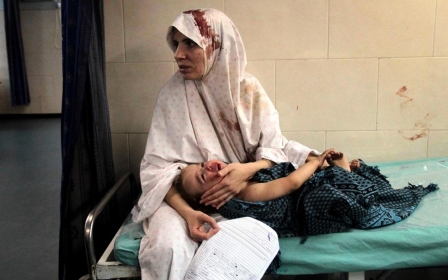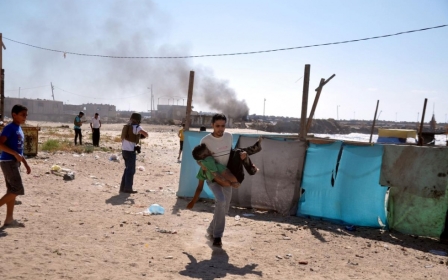When reporting becomes a weapon of mass deception

"I want to apologise now and tonight for my error on the broadcast Tuesday. We’ll correct it tonight on [ABC]", said a tweet from America's ABC News Diane Sawyer on 10 July after she falsely misreported the scene of the aftermath of an Israeli air raid on Palestinians in Gaza as destruction caused by Palestinian rockets.
Whether Sawyer's misreporting of events on the ground is a case of gratuitous ignorance or wilful omission, it actually points to a common pattern in mainstream news reporting that sees events only through Israeli lens and rationales and that often fails to present facts that loom large among Palestinians.
While playing a role of apparent objectivity in a situation of complete injustice, recent BBC and CNN reports actually erase from view the horrendous realities of the Israeli occupation and the callousness of Israel's attacks against the Palestinians, especially in Gaza, that led to the killing of over 200 Palestinians, of which more than 77 percent of them are civilians, including 36 children, the wounding of over 1500 Palestinians, and the destruction of over 626 houses and other civilian infrastructure, according to UN reports.
Presenting Israel as victim to Palestinian violence and as having no choice but to defend itself is too common a pattern in these news media. Take, for example, the analysis by BBC journalist Kevin Connolly that squarely locates the current crisis with Palestinian rocket fire which in turn provokes Israeli responses:
"But Israeli civilians judge the rockets by the intent behind them and not by their military effectiveness. They are grimly familiar with the ritual of running for shelter with their children when they hear a 15-second warning. They expect their government to put a stop to it. The problem is that there's no easy way of doing that."
In a similar fashion, the lead paragraph in a CNN report on 15 July read, "An Egypt-backed cease-fire between Israel and Hamas fell apart Tuesday as rocket attacks from Gaza were again answered by Israeli airstrikes." The report rationalises Israeli actions as retaliation to Palestinian rocket fire - and yes underlines the word "again" - thereby assigning responsibility for initiating the violence to the Palestinians.
Nowhere in the two reports is there any mention of the Palestinian people's right to self-defence and that no people would accept to live under a military occupation that continues to besiege them, oppress them and subject them to economic suffocation, deprivation, collective punishment and other forms of physical and structural violence.
What is problematic about these reports is the utter lack of background information that puts Israeli and Palestinian actions in context. Reading the BBC and CNN reports, one can only see that the context of Israel's crippling siege on Gaza, where 80% of its 1.8 million population are Palestinian refugees who were displaced from their homes in historic Palestine in 1948 and since then have been facing the harsh reality of Israel's military occupation, siege and humiliation in the world's largest open-air prison.
Disguising the reality of occupation as war between two equals is a stark case of problematic news framing. A BBC headline on 11 July which read, "Gaza-Israel conflict: What can Israel and Hamas gain?", and the lead paragraphs, falsely frame the situation as nothing more than a conflict between two equals trying to maximise their political benefits.
Another 10 July BBC headline reads "Israel and militants trade fire as Gaza toll rises" which again scants the stark asymmetry between Israel's superior fire power and its state-of-the-art anti-missile defence system, and Palestinian home-made rockets that caused panic among Israelis, an Israeli fatality and minimal damage to property. There is no mentioning whatsoever of the fact that Palestinian Gazans have no military capability to shoot down warplanes raining down bombs and death, nor do they have bomb shelters to go into in one of the most densely populated areas in the world.
Much space in these reports is given to quoting Israeli sources and explaining Israeli reactions to Palestinian fire rockets and what Israel can do to stop it, while giving a passing mention of the impact Israel's attacks and siege on Gaza's population. Blatant omission of incidents showcasing Israel's targeting of Palestinian civilians is a persistent pattern and the real impact of Israel's war on civilians is never humanised or put into perspective. Take, for instance, the Israeli attack on 11 July on the Fun Time Beach coffee shop on the beach near Khan Yunis, in southern Gaza, which killed nine civilians, including two 15-year-old boys, and wounded three, including a critically injured 13-year-old.
Thus, Palestinian suffering and victims become invisible and unworthy to be reported, and reporting on Palestinian casualties is sanitised and abstracted, and a detached, mitigated language predominates the reportage when Palestinian victims arrive to hospitals with charred bodies and torn limbs.
Such reporting that only scratches the shallow surface of reality shields Israel from the same moral scrutiny it applies to the Palestinians. What is worse, it provides a self-serving moral universe unburdened by the inconvenience over the suffering and pain of the unworthy “other”.
So long as BBC and ABC and other mainstream media pursue reporting believed by Palestinians and many activists to be antithetical to the promise of ethical journalism, it will contribute to prolonging a conflict and increasing the blood-spill peoples in the region, especially the Palestinians, have been paying.
- Dr Mosheer Amer is Professor of Discourse Analysis & Linguistics at the English department of the Islamic University of Gaza.
The views expressed in this article belong to the author and do not necessarily reflect the editorial policy of Middle East Eye.
Photo: Palestinian relatives mourn during the funeral of Bashir Abdel Aal, a 20-year-old who was killed by Israeli tank shells (AFP)
New MEE newsletter: Jerusalem Dispatch
Sign up to get the latest insights and analysis on Israel-Palestine, alongside Turkey Unpacked and other MEE newsletters
Middle East Eye delivers independent and unrivalled coverage and analysis of the Middle East, North Africa and beyond. To learn more about republishing this content and the associated fees, please fill out this form. More about MEE can be found here.




